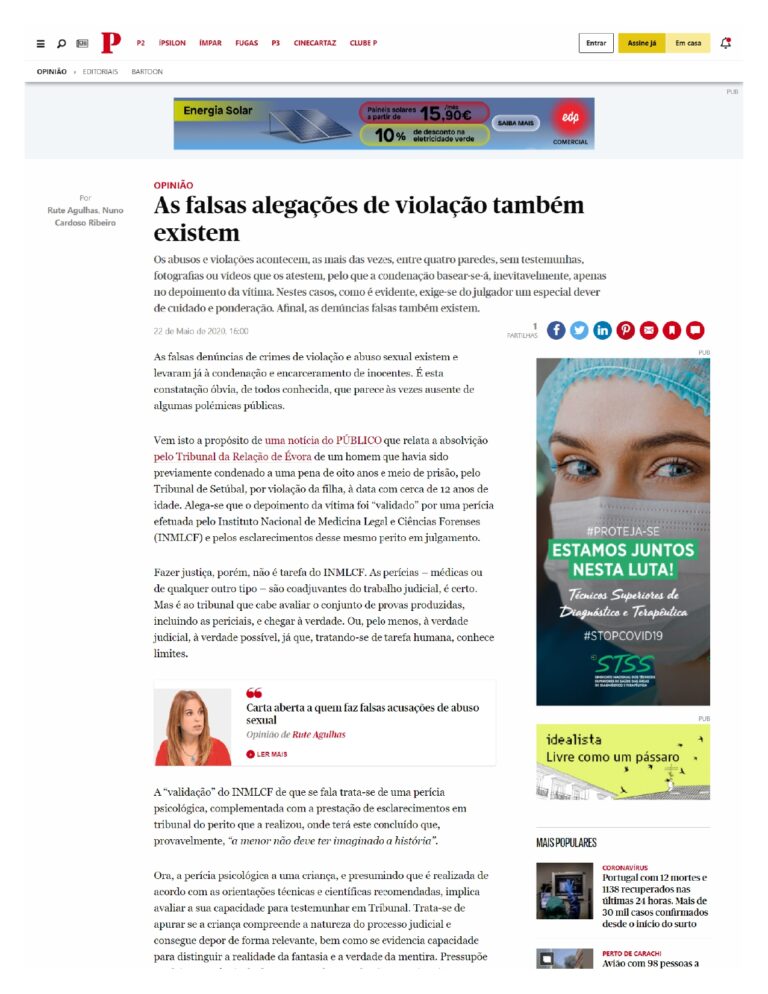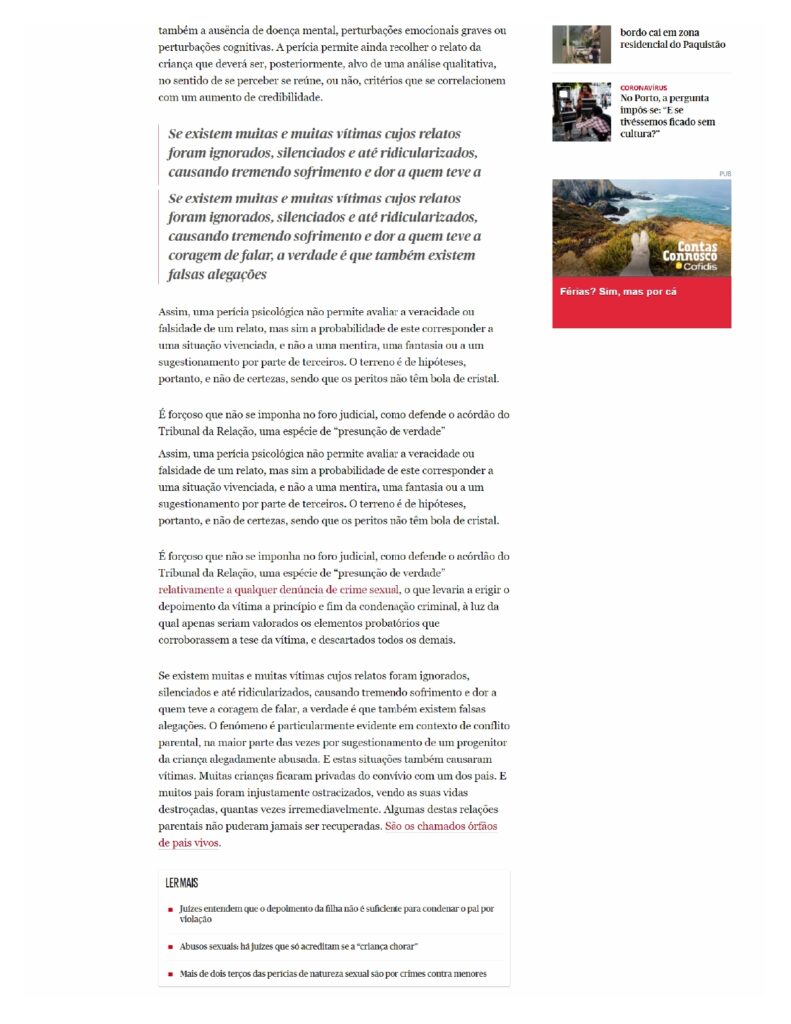Opinion article by our coordinator, Nuno Cardoso-Ribeiro, and Rute Agulhas, in Público on 05/22/2020 regarding false rape allegations. Read the article on Público’s website or the translation and the article in pdf below:
“False rape allegations also exist
Most of the time, abuse and rape happen within four walls, without witnesses, photos or video evidence, so conviction will inevitably be based on the victim’s testimony alone. In such cases, of course, a special duty of care and consideration is required of the judge. After all, false accusations also exist.
False reports of rape and sexual abuse do exist, and they have led to the conviction and imprisonment of innocent people. This is the obvious fact, known to all, that sometimes seems to be absent from some public polemics.
This comes in the wake of a story in PÚBLICO reporting the acquittal by the Evora Court of Appeal of a man who had previously been sentenced to eight and a half years in prison by the Setubal Court for raping his daughter, who was about 12 years old at the time. It is alleged that the victim’s testimony was “validated” by an expert report carried out by the National Institute of Legal Medicine and Forensic Sciences (INMLCF) and by the expert’s clarifications at trial.
Justice, however, is not the task of the INMLCF. Expert opinions – medical or of any other kind – are an adjunct to judicial work, to be sure. But it is up to the court to assess the body of evidence produced, including the expertise, and arrive at the truth. Or, at least, the judicial truth, the possible truth, since this is a human task, it knows its limits.
The “validation” of the INMLCF we are talking about is a psychological expertise, completed with the provision of clarifications in court by the expert who performed it, where he concluded that, probably, “the minor must not have imagined the story”.
Now, the psychological examination of a child, and assuming it is carried out in accordance with the recommended technical and scientific guidelines, involves assessing the child’s ability to testify in court. It is about whether the child understands the nature of the judicial process and is able to testify in a relevant manner, as well as whether he/she demonstrates the ability to distinguish reality from fantasy and truth from lies. It also presupposes the absence of mental illness, serious emotional disturbance, or cognitive impairment. Forensics also allows us to collect the child’s account, which should then be subject to a qualitative analysis, in order to understand whether or not it meets criteria that correlate with increased credibility.
Thus, psychological expertise does not make it possible to evaluate the truth or falsity of a report, but rather the probability that it corresponds to an actual situation, and not to a lie, a fantasy, or suggestion on the part of a third party. The field is one of hypotheses, therefore, and not of certainties, and experts do not have a crystal ball.
A kind of “presumption of truth” should not be imposed in the judicial forum, as the ruling of the Court of Appeal defends.
Thus, psychological expertise does not make it possible to evaluate the truth or falsity of a report, but rather the probability that it corresponds to an actual situation and not to a lie, a fantasy or suggestion on the part of a third party. The field is one of hypotheses, therefore, and not of certainties, and experts do not have a crystal ball.
It is imperative that a sort of “presumption of truth” regarding any accusation of sexual crime is not imposed in the judicial forum, as the sentence of the Court of Appeal defends, which would lead to erecting the victim’s testimony as the beginning and end of the criminal conviction, in the light of which only the evidential elements which corroborate the victim’s thesis would be valued, and all the rest discarded.
If there are many, many victims whose accounts have been ignored, silenced, and even ridiculed, causing tremendous suffering and pain to those who had the courage to speak out, the truth is that there are also false allegations. The phenomenon is particularly evident in the context of parental conflict, most often at the suggestion of a parent of the allegedly abused child. And these situations have also caused victims. Many children are deprived of the company of one of their parents. And many parents have been unjustly ostracized, their lives shattered, often irreparably. Some of these parental relationships could never be recovered. They are the so-called orphans of living parents.
The accounts of sex crime victims are, of course, an important or even decisive piece in the judicial construction. Most of the time, abuse and rape happen within four walls, without witnesses, photographs or video evidence, so conviction will inevitably be based on the victim’s testimony alone. In such cases, of course, a special duty of care and consideration is required of the judge. After all, false accusations also exist.
Article by Rute Agulhas and Nuno Cardoso-Ribeiro”


